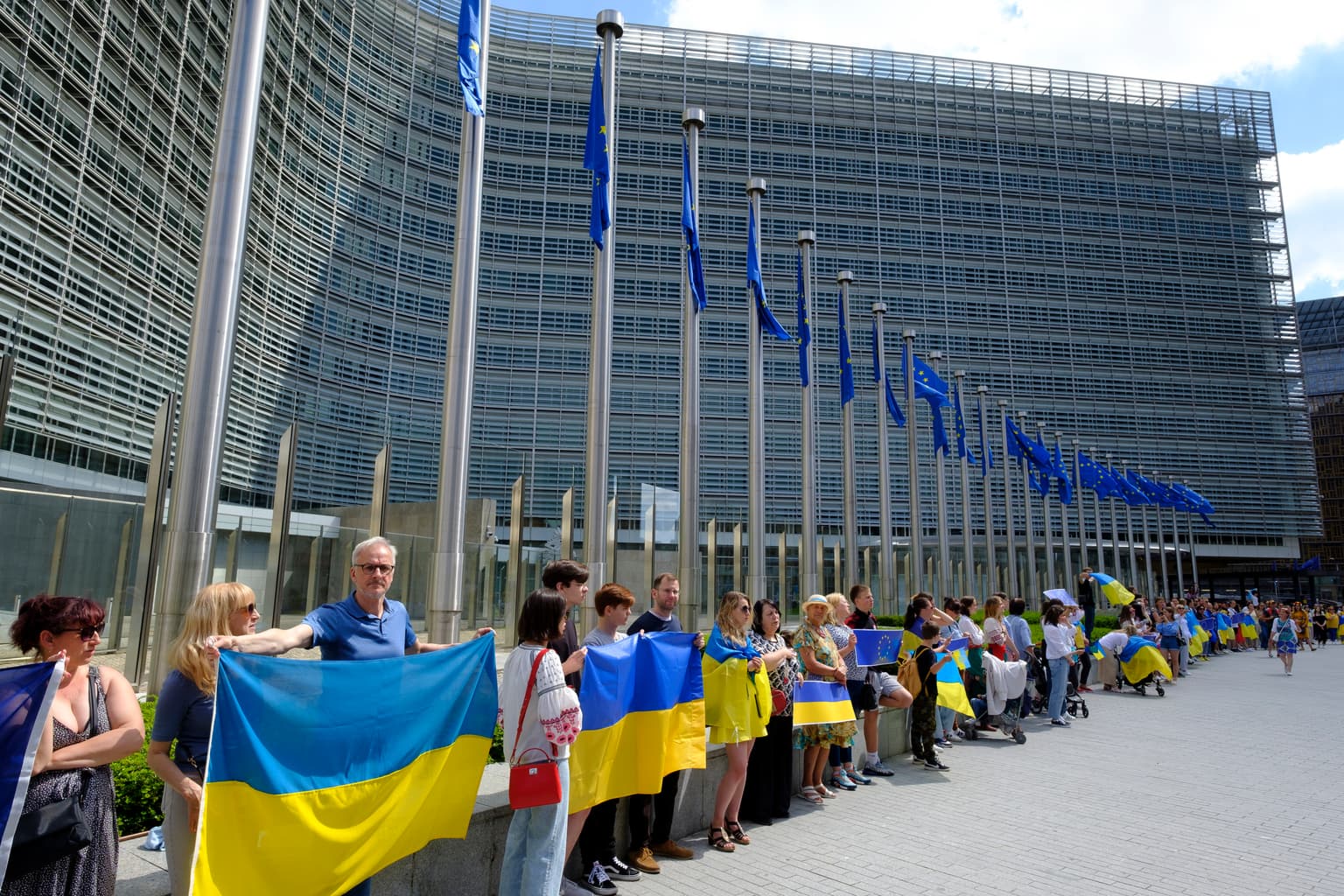Membership in the European Union has long been Ukraine’s key aspiration. The EuroMaidan Revolution of 2013-2014 was spurred on by the popular desire to get closer to the European Union and, ultimately, gain membership. Ordinary Ukrainians took to the streets and overthrew pro-Russian rule under the stars of blue EU flags.
Russia’s invasion of Ukraine has confirmed years of concerns raised by both the ex-President Petro Poroshenko and President Volodymyr Zelensky governments before European officials. For Ukraine, EU membership is no longer a luxury, but a necessity.
As the largest war on European soil since World War II rages on the EU’s eastern border, the winds of change are blowing within the European institutions, who have now recommended Ukraine’s membership and promised to expedite Ukraine’s application.
However, EU membership does not come easily, or quickly. Balkan nation Montenegro first applied for membership in 2008. It now expects to join by 2025, at the earliest.
Despite suffering around $4.5 billion of damage every week and hundreds of casualties on the front lines, Ukraine will still have to prove its readiness to adapt to EU institutions, operate within the common market, and reform its institutions at breakneck speed.
Uncertain time frame
By June 24, EU nations are expected to grant Ukraine its “candidate status,” a first step on a path towards full-fledged membership. Membership, however, is unlikely to come anytime soon.
Inna Sovsun, member of the Ukrainian parliament and formerly the Ukraine-EU Association Committee, says that candidate status would be a monumental turning point for Ukraine.
“The EU candidate status is extremely important for all Ukrainians, being a great impulse demonstrating the European support for Ukraine in this outrageous war,” the lawmaker said.
However, diplomats both in Ukraine and abroad are already warning Ukrainians to temper their expectations on full membership. French Europe Minister Clément Beaune had previously warned that Ukraine’s EU bid would not be finalized for “15-20 years,” a sentiment echoed by the representative of Ukraine to the European Union Vsevolod Chentsov.
“The EU by definition is not simple, and it’s not fast… But what we see is that the time frames are squeezed, if we judge against the normal EU practices,” Chentsov told the Kyiv Independent.
Even under a “fast-tracked” process, Ukraine will need to align itself with 32 chapters or 130,000 pages of the Acquis Communautaire as part of the official accession negotiations. After what may become years of negotiations, all EU member states must agree to accept Ukraine at an accession conference. Despite having candidate status since 1999, Turkey has only made agreements on one chapter of legislation over the course of the last 16 years.
“Of course, there is no magic wand that would turn everything in one day, or even one year…either we accelerate integration and reforms in the context of a reconstruction…or we put ourselves under even greater threat in the future,” Sovsun noted.
The Ukrainian Representation to the EU is reluctant to talk about time frames, however it claims to have already adapted 60-70% of the aquis over the course of the EU-Ukraine association agreement.
“We think that Ukraine will not be starting from zero,” says Chentsov.
Drastic reforms needed
It is now all but inevitable that Ukraine will gain EU candidate status in the coming week. The commission has officially recommended Ukraine’s status, but with additional conditions linked to the rule of law, macroeconomics, and anti-corruption legislation.
“Ukraine overall is well advanced in reaching the stability of institutions guaranteeing democracy, the rule of law, human rights, and respect for and protection of minorities,” a European Commission statement on June 17 noted.
But even after securing this status, Ukraine’s biggest battles will be yet to come. The European Commission notes that Ukraine needs to “continue ambitious structural economic reforms.” Ukraine must defend the process of its reforms across all sections of government, including its judiciary, which was once deemed so corrupt that Ukraine lost out on millions in international grants.
Chentsov remains optimistic that Ukraine will succeed in carrying out the necessary reforms. He points to the speedy decoupling of Ukraine from Russia’s electricity market, as well as the resilience of Ukrainian institutions during the war, as an example of Ukraine’s ability to adapt quickly to change.
“Our society is ready, and not only ready, our society really demands these changes. And it’s not because the EU wants us to streamline these processes and to finalise the reforms and the judiciary,” the ambassador said. "And also the digitalization. It's probably a recipe to fight, you know, those historical weaknesses and evils which Ukraine inherited. And also to fight corruption, to fight mismanagement. So my answer is yes, we are ready to work hard and we are not starting from zero."
The rate of digitalization in Ukraine has indeed been a welcome result of the Zelensky administration, having reduced the complexity of administrative processes for Ukrainians. The popular Diia (Ukrainian for “action”) application massively simplified gaining state certificates and other documents, as well as filing taxes. Earlier, the government adopted digital technologies for public procurement.
Nevertheless, these developments have done very little to stem the levels of corruption and increase economic development in Ukraine. Digitized public procurement has not stopped the dodgy takeover of government assets and Transparency International still ranks Ukraine the most corrupt country in Europe after Russia.
“The key in this case will not even be trade or financial flows, but the reforms that Ukraine must implement, and the investment in infrastructure that Ukraine needs to receive,” said Segey Fursa, expert at Dragon Capital, a leading Ukrainian investment bank.
Deepening integration
If Ukraine succeeds in its application, the country would be, by far, the poorest country in the EU. At most, the GDP per capita in Ukraine would be $4,872. Currently, the poorest EU country, Bulgaria, has more than double the GDP per capita at $11,683.
In many regards, Ukraine’s membership of the EU is recompense for numerous years of attempts to sideline Ukraine and keep Russia in the fold. The Nord Stream 2 pipeline, as well as Germany’s friendly relationship with Russia even after the illegal annexation of Crimea and invasion of Ukraine in 2014, only undermined Ukraine’s position in the EU.
“For many years, Ukraine has been, unfortunately, in the shadow of Russia politically, economically… There was a principal of ‘Russia first’ in this town (Brussels) and all policy on the level of institutions and member states for years was being subordinated to that principal,” Chentsov said.
Since the outbreak of the large-scale invasion in February, the EU has rapidly changed its foreign and economic policy to oppose Russia and integrate Ukraine. Despite this, Ukraine must still prove its worth as an economic partner within the European economic community. Chentsov believes that “Ukraine can really fit this new economic landscape.”
According to the ambassador, even before the potential acquisition of full EU membership, Ukraine will attempt to “fill a niche” within the European markets. This may be agriculture.
“Nearly 65% of arable land in Ukraine is black soil – the most fertile land in the world. Approximately 25% of the world’s black soil is located in Ukraine,” Sovsun noted.
Ukraine will attempt to align itself with the EU’s energy transition, providing extra energy exports, as well as supporting the European market with tariff-free grain, and other mineral resources.
“Ukrainian electricity is much cheaper and it’s cleaner,” Chentsov explained. “A significant portion is produced by nuclear plants, you have zero CO2 emissions because of that. Ukrainian agriculture is already a serious factor on a global level, but also here in the European Union.”
Russia’s invasion of Ukraine has opened new forms of cooperation between Ukrainian and Western authorities. Ukrainian officials, Chentsov said, even help their Western partners to coordinate international sanctions on Russia.
“We have quite close cooperation and coordination on those matters. It’s quite a sensitive area, but I can assure you that we take part in this coordination, both with the European Union, and other partners in the U.S, Canada, and so on,” the ambassador said.
Opposition growing
While Ukraine’s candidate status has been largely backed by most European countries and civil society groups, behind closed doors, some nations have begun to express concerns about the significance of Ukrainian membership in the EU, especially under an accelerated process.
Ukrainian diplomats are already feeling this quiet, reserved opposition.
“None of the 27 would say right in the face of the president ‘no,’ but what is happening behind the scenes is clear willingness to put obstacles into the process,” said Ukrainian Deputy Prime Minister Olha Stefanishyna in Brussels on June 9.
American economic publication Bloomberg, citing sources within the European Commission, states that both Denmark and the Netherlands had raised concerns over Ukraine’s candidate status due to failings in its democratic institutions, rule of law, and protection of minorities.
A sentiment confirmed by a source within the European Parliament Secretariat, who gave an anonymous comment to the Kyiv Independent. The official said that Ukraine may soon encounter resistance under the Venice Commission. Ukraine has been criticized in the past for its approach toward the status of the Russian language and other ethnic minorities by European authorities.
According to the Prime Minister of Portugal António Costa, the EU risks creating “false expectations” with Ukraine’s EU candidate status, noting that he did not believe that Ukraine would ordinarily meet the conditions to be considered for membership status.
All EU member states are now expected to back candidate status, but opposition to speedy membership remains. Greece, Cyprus, and the Netherlands have all opposed the notion of any “fast-tracking” of Ukraine’s EU application.
Rising energy prices, caused by Russia’s manipulation of the energy market and international sanctions, continue to divide European nations and embitter certain EU members. Hungary, Slovakia, and the Czech Republic have all gained exceptions to a sweeping oil embargo against Russia set out by the sixth round of EU sanctions.
Chentsov expressed his disappointment with Ukraine’s neighbor Hungary, which has opposed a ban on Russian energy exports and retains close ties with Moscow.
“What disturbs us is that Hungary tried to shift the focus of this discussion from the issue of how to stop Russia...to the issue of the cost of the sanctions for the member states,” he said.
Fortunately for Ukraine’s EU prospects, public solidarity with Ukraine is at record highs, and European administrations are reluctant to publicly oppose Ukraine’s membership prospects. A Eurobarometer survey conducted in May showed that some 66% of EU citizens support Ukraine’s ultimate accession to the union.
If Ukraine hopes to maintain the momentum of its membership bid, it will need to maintain public support.
A survey conducted by the European Council on Foreign Relations (ECFR) on June 15 has revealed that 57% now support Ukraine's accession, with an increasing number of citizens expressing concerns about the impact on the price of energy, as well as the rising cost of economic sanctions.
“The findings of the poll suggest that European public opinion is shifting and that the toughest days may lie ahead,” the researchers noted.











